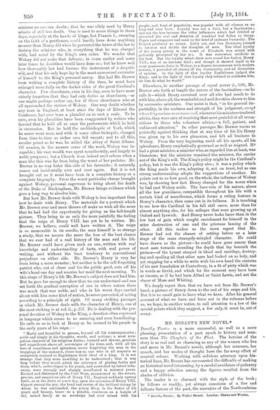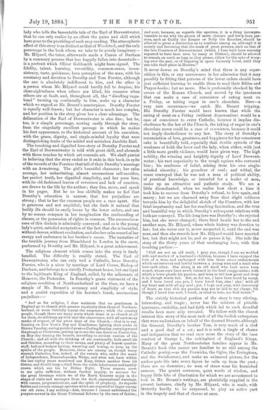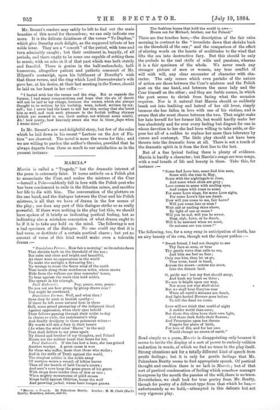MR. BESANT'S NEW NOVEL.*
• Dorothy Forster. By Walttr Besant. London: Hutto and Windy& Dorothy Forster is a more successful, as well as a more pleasing, presentation of a past epoch in history and man- ners than The Chaplain of the Fleet. The heroine of the • story is as real and as charming as any of the women who live and move in Mr. Besant's novels, although her manners, her speech, and her modes of thought have the far-away effect of musical echoes. Working with sedulous accuracy upon his- torical lines, Mr. Besant has surmounted the difficulty of making an historical novel interesting, by a careful avoidance of pedantry and a happy selection among the figures recalled from the shades of oblivion.
The reader is so charmed with the style of the book ; he follows so readily, yet always conscious of a fine and delicate flavour of the past, the narrative of the Northumbrian lady who tells the lamentable tale of the Earl of Derwentwater, that he can only realise by an effort the pains and skill which have gone to the providing of such easy reading. The atmospheric
effect of this story is as distinct as that of Woodstock, and the only personage in the book whom we take to be purely imaginary— Mr. Hilyard, the tutor, afterwards made a Canon of Durham
by a summary process that has happily fallen into desuetude— is a portrait which Oliver Goldsmith might have signed. The fidelity, talent, learning, versatility, common-sense, incon- sistency, taste, quickness, keen perception of the man, with his constancy and devotion to Dorothy and Tom Forster, although the one is absolutely indifferent to him, and the other is a person whom Mr. Hilyard could hardly fail to despise; his clear-sightedness when others are blind, his resource when others are at fault, and, throughout all, the " diverging vaga- bond" turning up continually in him, make up a character which we regard as Mr. Besant's masterpiece. Dorothy Forster is equally well drawn ; but her character is much less complex, .and her position in the story gives her a clear advantage. The delineation of the Earl of Derwentwater is also fine ; but he, too, is a simple personage, moving easily through the story, from the singularly excellent passage in which he makes his first appearance, to the historical account of his execution, with the grace, dignity, and single-minded loyalty that were distinguishing traits of the misled and mistaken Jacobite Earl.
The touching and dignified love-story of Dorothy Forster and
the Earl of Derwentwater is told with great skill, and abounds with those touches by which art conceals art. We shall persist in believing that the story ended as it ends in this book, in spite of the records of the Forsters that tell of their Dorothy's marriage with an Armstrong. The girl's beautiful character; her calm
courage, her unhesitating, almost unconscious self-sacrifice, her perfect truth, her dignified simplicity, and her pure love, with its old-fashioned leaven of reverence and lack of exaction, are drawn to the life by the author ; they live, move, and speak
in his pages. But he no less skilfully makes us feel that Dorothy's education is narrow, that her prejudices are strong ; that to her the common people are a race apart. She is generous and not unpitiful; but she finds it natural that
bodily ills should be easily borne by the lower orders, and can by no means compass in her imagination the confounding of classes, or the possession of rights in common. The unconscious- ness of this disdain is admirably conveyed ; and so is the young lady's quiet, satisfied acceptation of the fact that she is beautiful, without demur, without exultation, and also her calm record of her energy and endurance in her brother's cause. The narrative of the terrible journey from Blanchland to London in the snow, performed by Dorothy and Mr. Hilyard, is a great achievement.
The religious element which comes into the story is finely handled. The difficulty is readily stated. The Earl of Derwentwater, who can only wed a Catholic, loves Dorothy Forster, who is a niece by marriage of Lord Crewe, Bishop of Durham, and belongs to a strictly Protestant house, but one loyal to the legitimate King of England, called, by the adherents of Hanover, the Pretender. In Dorothy's grave statement of the religions condition of Northumberland at the time, we have a sample of Mr. Besant's accuracy and simplicity of style, and a quaint exposition of his heroine's frank, unconscious prejudices :—
.6 And as for religion, I dare maintain that no gentlemen in England go to church with greater regularity than those of Northum- berland, or more dutifully repeat the responses ; while the country people, though there are many parts where there is no church at all for them, do still keep up with zeal the observance, with all customary marks of respect, of the great days of the Church,—that is to say, feasting on New Year's Day and Candlemas, fighting their cocks on Shrove Tuesday, eating parched peas on Carling Sunday, carrying round the plough at Christmas, getting up to see the ann dance on Easter-day, on May-day beating the bounds, according to ancient custom of the Church ; and all with the drinking of ale continually, both small ale and October, according to their means, and plenty of honest quarter- staff, bull-and-badger baiting, wrestling and boxing, to keep up the spirits of the people. Moreover, there are among us, though many staunch Catholics. few, indeed, of the vermin who, under the name of Independents, Nonconformists, Whigs, and what not, have within the last eighty years murdered one King, driven another from his throne, and do still keep a third from the noble inheritance and earthly crown which are his by Divine Right. These reasons seem to me quite sufficient, without further inquiry, to account for the great blessings which we of the North Country enjoy in the shape of visits and messages from the dead, supernatural warnings, with omens, prognostications, and the spirit of prophecy. As regards fairies and certain strange spectres which are reported to linger among our old ruins, I say nothing—first, because I cannot understand the purpose served in the Great Universal Scheme by the race of fairies; and next, because, as regards the spectres, it is a thing incompre. hensible to me why the ghosts of mere obscure and lowly-born per- sons, such as Caddy the Reaper or Nelly the Knocker, should be allowed so great a distinction as to continue among us, although it is seemly and becoming that the souls of great persons, such as that of the late Countess of Derwentwater (which I hear hath been recently reported to have been seen by many at Dileton), should be allowed to remain on earth as long as they please, either for the sake of weep- ing over the past, or of lingering in spots formerly loved, until they can take their place in Heaven."
It never dawns on Dorothy's mind that there is any super- stition in this, or any narrowness in her admission that it may possibly be fitting that persons of the lower orders should have just sufficient learning to enable them to read their Bibles and Prayer-books ; but no more. She is profoundly shocked by the errors of the Roman Church, and moved by the ignorance that can make a case of conscience of eating meat on a Friday, or taking sugar in one's chocolate. Here—a very rare occurrence—we catch Mr. Besant tripping. His Dorothy Forster would have known that while the eating of meat on a Friday (without dispensation) would be a case of conscience to every Catholic, because it implies dis- obedience to the law of the Church, the taking of sugar in one's chocolate never could be a case of conscience, because it could not imply disobedience to any law. The story of Dorothy's renanciation of love, greatness, and happiness for her conscience sake is beautifully told, especially that double episode of the weakness of bath the lover and the lady, when either, with just a little more gentle violence, would have given way. The high nobility, the winning and knightly dignity of Lord Derwent- water; his vast superiority to the rough squires who surround. him ; his readiness of belief, arising from his own single- minded sincerity ; his grandeur of soul ; and withal, the sense conveyed that he was not a man of political ability, of practical knowledge, or intended for a leader of men, make up an attractive and pathetic study. We are a little disenchanted, when we realise how short a time it took him to recover from Dorothy's refusal, to love again, and marry ; but we are charmed away from that slight coldness towards him by the delightful sketch of the Countess, with her fatal impetuosity and her far-reaching fascination, and the true and beautiful way in which Dorothy's subsequent relations with both are conveyed. The life long love was Dorothy's ; she rejected him, but she never changed ; there lived beside her to the end another man, Mr. Hilyard, whose whole history was devotion to
her; but she never saw it, never suspected it, until the end was near, and then she records how Mr. Hilyard would have married her, but that might not be, and so passes it by. She tells the story of the thirty years of that unchanging love, with this touching preface :— " Call me not an old maid, I pray you, though I am no wedded wife and mother of a husband's children, because I have enjoyed the love of a man, and exchanged with him those sweet endearments which are innocent and lawful between a young man and a maid who love each other. She alone is an old maid who Lath never been wooed, whose ears have never listened to the fond exaggerations with which a lover pleads his passion, and tries to tell how great and deep it is, though words fail. But, as for me, I have been loved by many, and I have loved one, yea, I have loved him, alas ! alas ! with all my heart and with all my soul ; yet, I hope and pray, with innocency of heart, so that this my passion may not be laid to my charge, for though I loved him well, I loved, or tried to love, my God better."
The strictly historical portion of the story is very stirring, interesting, and tragic ; never has the mixture of pitiable ignorance, credulity, and bad-faith which led to such dreadful results been more ably revealed. We follow with the closest interest this story of the most rash of all the foolish enterprises that were undertaken on behalf of the doomed Stuarts, although the General, Dorothy's brother Tom, is very much of a clod and a good deal of a sot ; and it is with a tingle of shame and indignation that we read once more the story of the base conduct of George I., the unkingliest of England's Kings. Many of the great Northumbrian families appear in Mr. Besant's book (the names are familiar to us still among the Catholic gentry,—as the Fenwicks, the Ogles, the Erringtons, and the Swinburnes), and make an animated picture, for the author puts life into every figure he calls up from the past ; there are no dummies ; no men of straw wear his burnished armour. The quaint sentences, quiet words of wisdom, and happy little bits of illustration for which we are accustomed to look in Mr. Besant's writings, are plentifully supplied in the present instance, chiefly by Mr. Hilyard, who is made, with dexterity hardly to be surpassed, to play an active part in the tragedy and that of chorus at once. Mr. Besant's readers may safely be left to find out the main beauties of this novel for themselves ; we can only indicate one
more. It is the delicate daintiness of the verses " To Daphne," which give Dorothy such delight, as the supposed tribute of her
noble lover. They are a " conceit" of the period, with tone and turn admirably caught ; but their sentiment is, happily, of all periods, and there ought to be some one capable of setting them to music, with an echo in it of that past which was both stately and fanciful. There is genius in the half-melancholy, half- humorous, altogether patient and pathetic comment of Mr. Hilyard's postscript, upon his fulfilment of Dorothy's wish that those verses, and the ring which Lord Derwentwater's wife gave her, at his desire, at their last meeting in the Tower, should be laid on her heart in her coffin :—
" I buried with her the verses and the ring. But as regards the former, I had many compunctions, and hope that the sin of deceit will not be laid to my charge, because the verses, which she always thought to be written by his lordship, were, indeed, written by my- self ; but I never had the heart to tell her this, seeing that she loved him so well, and took such pleasure in the foolish trifling rhymes (which yet seemed to me, their author, not without some merit). Ah ! how pretty, how heavenly sweet she was in those days when I wrote them !"
In Mr. Besant's new and delightful story, but few of the rules which he laid down in his recent " Lecture on the Art of Fic- tion" are observed. The novel is none the worse for this; and we are willing to pardon the author's theories, provided that he always departs from them so much to our satisfaction as in the present instance.




































 Previous page
Previous page